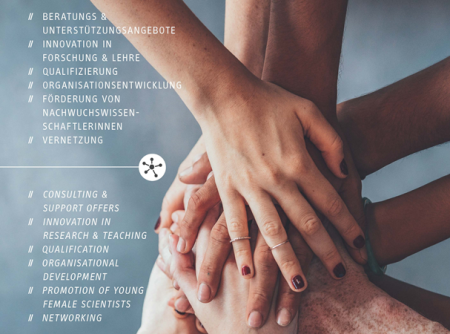Newsletter October 2020
Latest News |
|
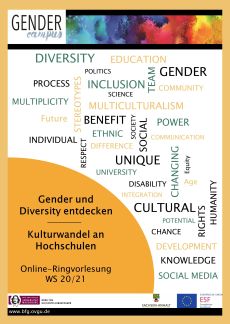
|
Interdisciplinary Lecture Series ONLINE: "Discovering Gender and Diversity - Cultural Change at Universities“
Gender and diversity, and the associated gender justice and anti-discrimination, are current topics at universities, from which new challenges for higher education and scientific careers arise. They are rooted in the increasing diversity of their members, internationalization and the social demand for equal opportunities. By consciously dealing with these challenges, a cultural change can be initiated at universities that meets the demands of society. The lecture series takes up these challenges and topics, presents current research results on how to reduce discrimination and create equal opportunities at universities and discusses successful practical examples of diversity measures and strategies. The thematic objectives of the lecture series will also be considered against the background of digitization, which has gained considerable presence, not least due to the Corona crisis. Guest speakers from research and practice will present and discuss their (research) work. These are linked to topics that are also being worked on at the Otto-von-Guericke University Magdeburg. The lectures will be moderated by experts from the OVGU's university practice in order to stimulate reflection processes and discuss possible options for action. Students of all disciplines and employees are invited to attend the lecture series. The public event is also aimed at representatives of gender studies, gender equality officers and all regional players in the field of gender and diversity. All information on the lecture series and the program of events can be found here |
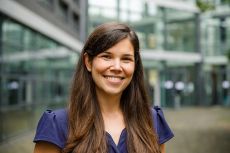
|
Diversity is more than gender equality
Many companies have an insufficient understanding of diversity and do not fully recognize the benefits of diversity for economic success. This is the finding of the German Diversity Monitor 2020, which was developed by the Chair of Business Administration, International Management, in cooperation with the BeyondGenderAgenda initiative. Ines Perl spoke with the scientific director of the study, Professor Dr. Susanne Schmidt, about the understanding of diversity, women in executive board positions and recommendations to small and medium-sized enterprises (SMEs) on diversity issues. Read the interview |
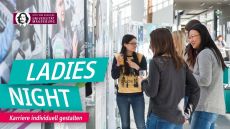
|
Call for applications for the Young Talent Award of the Ladies Night for Women in Engineering Sciences
The Ladies Night for Women in Engineering Sciences announces an award for young scientists. It is aimed at female students from the fields of process engineering, mechanical engineering, electrical engineering, mathematics and natural sciences. Interested female students have until 22.03.2021 to create a science poster that summarizes their own scientific work (bachelor's or master's thesis, hi-fi project, internship project or similar) and presents it in a comprehensible and convincing way for the non-specialist reviewers. The reviewers pay particular attention to whether the scientific and technical benefits of the work are convincingly presented to the general public. Information on the creation of the poster can be found on the Ladies Night website. The three winning posters will be announced during the Ladies Night 2021. Further assistance for the creation of the poster is provided by three workshops in January and February. To participate, a binding registration by 01.12.2020 is absolutely necessary. |
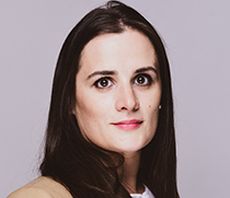
|
New assistant professor at the Faculty of Process and Systems Engineering
Jun. Prof. Dr. Alba Dieguez Alonso took over the chair of Heat and Mass Transfer at the Faculty of Process and Systems Engineering on September 1, 2020. She received her doctorate with distinction in 2015 at the TU Berlin on the topic "Fixed-bed biomass pyrolysis: mechanism and biochar production". The research work of Alba Diéguez Alonso deals, among other things, with the thermochemical transformation of wood. |
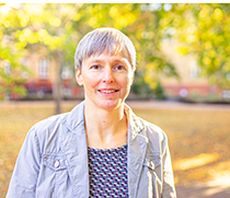
|
New Research Officer at the Medical Faculty
Dr. Heike Kaasch has been the first contact person in the Department of Research at the Medical Faculty since September 1, 2020. The 45-year-old replaces the previous head Sigmar Beust, who held this position since 1993. Most recently, Dr. Heike Kaasch worked as a scientific advisor at the German Aerospace Center (DLR) in Bonn. Friederike Suessig-Jeschor spoke with Dr. Kaasch about her new field of activity and the importance of young scientists in medical research, and also asked what challenges future research funding in medicine will face. Read the interview. |
Grants and Prizes |
|
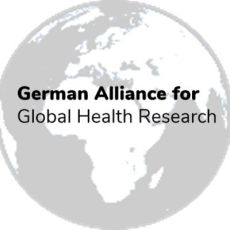
|
Research for Global Health: German Alliance for Global Health Research
In the German Alliance for Global Health Research, which is financed by the BMBF, researchers of all career levels and disciplines with an interest in global health can network with each other and initiate innovative research projects. You are invited to participate in the Alliance. The German Alliance for Global Health aims to promote interdisciplinary networking and research in the German global health community. The Alliance has initiated a register in which researchers from all scientific disciplines can register. There are the following calls for project ideas:
Full members of the Alliance and thus eligible to apply are all OVGU scientists (professors, postdocs, PhD students) as well as employees in research and transfer management and lecturers who have an employment contract of at least 20% of a full-time job at the university and all registered PhD students. For further information, please contact the Research Funding Advice/EU-HS Network at mailto:martina.hagen@ovgu.deor directly at German Alliance for Global Health Research e: secretariat@globalhealth.de p: +49 30 450 572 100 |
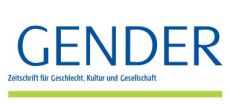
|
Magazine GENDER - Prostitution and Sex Work (Issue 1/22)
Prostitution and sex work have long been known as conflictual issues. Recently, the discussion has been added about differences between heterosexual, queer, and trans identities and the general significance of normative notions of relationships, sexuality, and intimacy. As an object of knowledge, sex work/prostitution has diversified considerably. The GENDER magazine focus aims to make visible different disciplinary and interdisciplinary approaches. Editors are Nicola Behrmann, Sabine Grenz, Martin Lücke, Heike Mauer, Romana Sammern and Maria Wersig. You are invited to submit an abstract until November 15, 2020! The complete call (in German and English) can be found at https://www.gender-zeitschrift.de/call-for-papers-gz |
|
Save the Date: Kick-off event for Horizont Europa November 12, 2020
With an online kick-off event on November 12, 2020 from 9:30 to 15:30, the EU university network together with the national contact points for SMEs and life sciences would like to present the diverse funding and participation opportunities in HORIZON EUROPE. The program is expected to start on January 1, 2021, with a duration of seven years. With a budget of 81 billion euros, it is the world's largest public funding program in all fields of research and innovation. The event is aimed at scientists, entrepreneurs and administrative staff from all over Saxony-Anhalt. Afterwards, participants will have the opportunity to get to know a medical and technology-based section of the research landscape of Saxony-Anhalt. You can find further information here |
|
|
Call for Papers: JOURNAL FOR FEMINIST POLITICAL SCIENCE | Black Feminism
Black feminist theories and activist perspectives from political struggles are as old as feminist movements in general. Cécile Fatiman, Sojourner Truth, Yaa Asantewaa, Ida B. Wells, Claudia Jones, and others did not call themselves 'feminists', yet they stood for the abolition and overcoming of enslavement (abolitionism) and colonialism, against racism and capitalism, and for gender justice and international solidarity. Against this background, African and Afrodiasporic activists criticized and analyzed the entanglements of social relations of domination and oppression, including shared struggles and different knowledge bases. Even within US feminist movements from the 1970s onwards, it was black feminists such as the Combahee River Collective and Patricia Hill Collins who demanded that the structural interlocking and interwoven nature of social power relations be addressed. The focus issue "ZEITSCHRIFT FÜR FEMINISTISCHE POLITIKISSENSCHAFT" calls for contributions. The aim of the booklet is to present, expose and make known (or make them known) themes, debates, positions, interventions, struggles and movements along a broad spectrum of black feminist theories from the global African Diaspora (e.g. African Feminisms and Womanisms, Afro-Brazilian theories and activisms, Afro-Caribbean or Afro-Turkish feminist approaches) so that they can be addressed and discussed with reference to the transnational dimension of black feminism. In doing so, the different approaches, epistemological assumptions, and political priorities for the analysis, research, and critique of intersectional social relations will also be made clear. At the same time, it is a concern to make black feminist approaches, which are fundamental to critical social theory, fruitful in their range of content and diverse points of contact within the German-speaking world. Against this background, the editors welcome theoretical, empirical, and methodological contributions and those that combine them. We also welcome contributions that illustrate the political and social-scientific significance of the art, cultural and aesthetic productions of Black Feminism. (Pdf in folder). Submission of a one- to two-page abstract is requested until November 30, 2020. Femina Politica sees itself as a feminist journal and promotes academic work by women both inside and outside the university. Especially in this issue, abstracts with qualified content by women and non-binary persons who have been marginalized several times are preferred. Possible approaches and topics as well as the complete call can be found here: |
|
|
Christiane Nüsslein-Volhard Foundation for the support of young female scientists with children
The Foundation for the Promotion of Science and Research, established in 2004, supports talented young female scientists with children to give them the freedom and mobility they need for a scientific career. The foundation wants to help prevent outstanding talents in scientific research from being lost. It is aimed at female doctoral and postdoctoral students in a subject in the experimental natural sciences or medicine. In terms of their scientific potential, women are underrepresented in leading positions in science and research. The special feature of the Foundation is that it provides practical support to address the very problem that makes life difficult for many female researchers, namely the difficulty of reconciling family responsibilities with the professional goal of becoming an independent researcher. Monthly financial support for household help and additional childcare is intended to relieve young female scientists of domestic tasks. The time thus gained gives them the opportunity to continue to work at a high scientific level despite the double burden. The foundation would like to help ensure that more highly qualified women can participate in top-level research in Germany in the future. For more information on how to apply, please read the information sheet. |
|
Events |
|
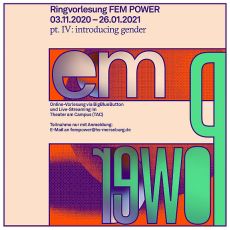
|
Merseburg University of Applied Sciences: FEM POWER lecture series from November 2020 (digital)
This year's lecture series with the title "pt. VI. Introducing gender" deals with subject cultures, subject specificity and the impact of gender: What influence does gender and gender studies have on the individual subject areas? What effects do subject cultures have on the choice of studies? How can gender be integrated into the academic disciplines and further into teaching? What resistance and potential exists? These and many other questions will be addressed in a total of eight lectures. The role of gender and gender studies in computer science, biology, chemistry, marketing and business studies, for example, will be examined from a subject-specific perspective. The lecture series is open to all students and interested parties from all departments. We would like to invite you to discuss together from the respective perspective of your scientific background! The organizers are especially pleased that the digitalization of the format has led to renowned scientists and practitioners from beyond Saxony-Anhalt agreeing to participate. This strengthens the discussion and debate about the impact of gender and enables a high level of professional and interdisciplinary exchange within the eight-part lecture series. In order to deepen the discussion not only theoretically but also practically and to bring it into the university, comments by representatives of the respective departments of Merseburg University of Applied Sciences are currently planned as "Insight into Science on Site". You can find more information on this at: https://www.hs-merseburg.de/fempower |
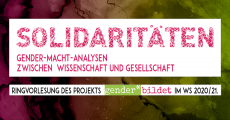
|
Lecture series of the project gender*bildet (MLU) in WS 2020/21 Solidarity(s)
In recent months we have witnessed more crisis events than the younger generations have ever experienced: the Corona pandemic, racist, anti-feminist, anti-Semitic and anti-Muslim violence and murders, the climate crisis, the threat of civil wars, the (re)strengthening of authoritarian rulers in Europe and around the world and, linked to this, the dismantling of hard-won social rights. The list can be continued. In this period, social movements are gaining new significance and opening new windows of action. In the contexts listed, local, national and global movements are forming or strengthening, in which the building of alliances based on solidarity is central. In this context, scientific discourses are also addressed, primarily with the aim of clarifying the conditions of this alliance-building and shifting existing (social and national) boundaries between political activisms. Here, queer-feminist and intersectional movements and research have long made a very significant contribution. At the same time, they move in the field of tension between particularist and universalist perspectives on inequality relations that decisively influence the (in)possibility of political alliances. The lecture series focuses on this field of tension and addresses three different levels:
The event takes place online. If you are interested, please register by mail to: gender.bildet@uni-halle.de and you will receive the access data. |
|
Anniversary Ring Lecture on the occasion of the 20th anniversary of the Center for Women's and Gender Studies at the University of Leipzig
On the occasion of its twentieth anniversary, the Center for Women's and Gender Studies at the University of Leipzig is organizing an anniversary ring lecture on "Gender Studies in the Scientific Disciplines" starting November 3. Teachers will convey the basics of gender studies in various academic disciplines, such as sociology, medicine, sports psychology and sociology, German studies or philosophy. The course is broadcast online on Zoom and is open to interested parties. Further information and the lecture plan can be found on the homepage of the Center for Women's and Gender Studies. |
|
|
Impulses for Europe: Equal Opportunities Structures and Diversity in Research | Online Conference on November 11 and 12, 2020
On November 11 and 12, 2020, a BMBF conference on "Impulses for Europe: Equal Opportunities Structures and Diversity in Research" will take place. This conference is being organized within the framework of the German EU Council Presidency. The aim is to discuss future-oriented approaches for more equal opportunities in the science system with those present and to develop them further for the European Research Area. The aim is to provide forward-looking impulses for structural equality goals as well as gender and diversity aspects in research for the European Research Area. In keynotes, panel discussions and forums, strategies and visions are discussed that are suitable for structurally anchoring equal opportunities and strengthening the integration of gender aspects in research. Due to current contact restrictions, the conference will take place as a digital event. Detailed information can be found here. If you have any questions regarding content, please contact gender@dlr.de. |
|
|
Microlearning: 90-minute learning impulses on the subject of "Actively dealing with continuous stress and pressure" on 13.11.2020
Our everyday life is strongly determined by time and performance pressure. In order that we do not suffer any damage, we have to identify stressful situations and actively find constructive solutions for ourselves. The seminar supports you in developing different options for action.
You can register here |
|
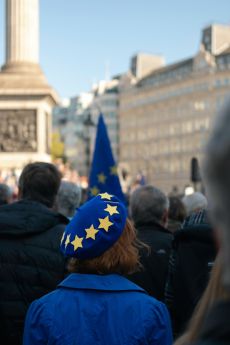
|
StreitWert: Equality Project Europe - Big Throw or bitter disappointment? Online event on 12 November 2020
In March 2020, the European Commission under Ursula v.d.Leyen presented its strategy for gender equality for the period from 2020 to 2025 in the form of a binding Commission Communication: Gender-based violence is to be stopped, gender stereotypes are to be fought, as well as the wage and pension gap between the sexes. Care and nursing tasks are to be distributed more fairly. Gender parity in decision-making processes and in politics is to be introduced. The strategy will take a two-pronged approach: Gender mainstreaming and an intersectional perspective in "all major initiatives" of EU policy. The current German EU Council Presidency has also placed an emphasis on gender equality and wants to take into account aspects such as: visibility, equal opportunities in financial support plans, role models, participation in decision-making processes, good examples of empowerment of women, equal pay, ending violence against women. The reactions of women's and gender equality policy actors were divided. The corona pandemic has pushed the necessary debate on these gender policy goals and their implementation out of the media. It is therefore time to take a look at what the EU Commission and the German Presidency of the Council of the European Union have initiated in terms of gender and equality policy: In times of right-wing populism, racism, anti-feminism and anti-democratic developments in some member states, is the EU still a gender equality project with a model character? In the Online-StreitWert the following questions are discussed with various guests:
Registration is requested. All information on the event can be found here |

|
NEW ONLINE! Show attitude! Arguing against antifeminist statements
"Gender Delusion - Early Sexualization - Reeducation!" Not only in right-wing conservative circles like the AfD, targeted attacks on feminism and gender issues are becoming increasingly acceptable. In the seminar the handling of antifeminist statements is trained. The focus here is primarily on the development, defense and strengthening of counter positions. Participants will be strengthened in their ability to argue their case using a variety of methods. When: Saturday | 14. November 2020 | from 10 am to 3 pm Information on registration can be found here |
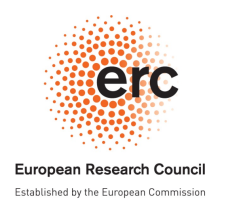
|
Online workshop on gender and the gender dimension in frontier research on 16 November
On 16 November 2020, the ERC will host a full-day online workshop on gender and gender in frontier research. The aim of the event is to exchange views and raise awareness of gender dimensions in the design and implementation of scientific projects. The following topics will be addressed:
The workshop will conclude with a political dialogue. Current information, the agenda and instructions for registration can be found here |
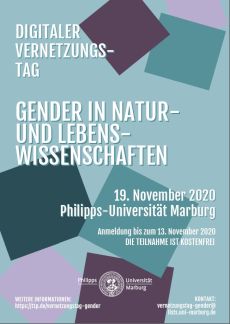
|
Digital Networking Day: Gender in Science and Life Sciences on November 19, 2020 ONLINE
The Digital Networking Day Gender in the Natural and Life Sciences will highlight opportunities for gender science research within the natural and life sciences and network interested scientists beyond their own disciplines. The aim of the networking day is to highlight the links between society and science and to locate gender as a central category of knowledge in the natural and life sciences. The networking day is intended to motivate (young) scientists to conduct research in their discipline from a gender perspective. Please register by November 13, 2020 (with details of the desired workshop) at vernetzungstag-gender@lists.uni-marburg.de. You will then receive the access data for the online portal and further information. Participation is free of charge. Detailed information on the program can be found in the event flyeror on the website of the Philipps University of Marburg. |
|
Save the Date: Digital Conference "Critical Gender & Diversity Knowledge. Challenges and Prospects"
The conference, organized by the FH Nordwestschweiz and the think tank "Gender & Diversity", will take place online on November 21 and 22, 2020. The event is designed as a forum for exchange between science, politics, education, business, media, the arts and civil society and will be held in three languages (German, French, English). Topics of the panels on Friday include "Gender Equality including Language: How to Deal with Resistance" and "Dealing with Power and Difference Relationships in the Higher Education Context - Analyses, Approaches and Perspectives", and on Saturday "Male Spaces of Power. How can a transformation of the gender order in science and politics succeed?" Participation in the conference is free of charge. The program and registration form can be found on the conference website. |
|
|
Perform convincingly. Speaking to groups with personality | Seminar on November 20, 2020
In this workshop the participants learn the essential criteria that support a confident and effective speaking in front of groups. The emphasis is on the individuality of the participants and thus their authentic charisma. Can your listeners follow well? Can you show your competence the way you want to? Is it pleasant to listen to you? Do you feel comfortable with your own speaking style? Concrete and constructive feedback leads to a realistic self-assessment and personal development. In the workshop, each participant should have the opportunity to speak freely for about 6-8 minutes on a topic of his/her choice, either spontaneously or with keywords prepared in advance - unfortunately, there is no preparation time within the workshop. If you have any questions, please contact sauer@sprechtrainerinnen.de. Further information on the seminar and registration details can be found here |
|
|
Digital writing week for doctoral students from 30.11. to 04.12.2020
Attention doctoral students! How can you advance your writing project with motivation and pleasure? Which writing strategies and working methods have a productive effect on your writing process? At which writing locations can you concentrate on your work and how can you make good use of your home for writing? How can you manage to integrate writing firmly into your everyday life? And how can you deal with uncertainties, hurdles and blockages in writing? These and similar questions will be the focus of the digital writing week from November 30 to December 4, 2020 under the motto "Side by side - side by side". The offer provides a space for learning and applying creative writing strategies, working on your own text and the accompanying exchange with other doctoral students about individual writing experiences. In this way, a structured learning and working process is created, in which you will get to know academic writing in a new way and overcome writing hurdles with new energy. You will use writing as an opportunity to develop your thoughts and results and at the same time approach a joyfully written thesis. Registrations are possible up to 15.11.2020 by mail to schreibwoche@gmx.de. All information about the writing week can be found here |
|
|
Gender-sensitive language and strategic implementation at universities | Workshop on December 3, 2020 ONLINE
The workshop aims to give participants an introduction to the controversial topic of "gender-sensitive language". The workshop offers a first overview of the genesis, forms and current debates ("War of the Stars"). In a second part, guidelines and handouts from the university context will be presented and discussed, and finally possibilities for strategic implementation will be worked out (and discussed). Registration is possible until November 23rd. The workshop flyer as well as information on registration can be found here |
|
University and Politics |
|
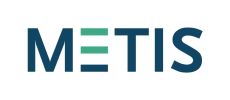
|
METIS - Gender Equality and Family Friendliness in Research Alliances at Humboldt-University Berlin
The digital information platform METIS networks clusters of excellence, collaborative research centers and (international) research training groups with a link to Humboldt University Berlin on the topic of gender equality and family friendliness. It informs about current equal opportunities offers (NEWS), describes possibilities to spend equal opportunities funds according to DFG guidelines (SERVICES FOR MEMBERS) and presents the manifold equal opportunities work of the participating HU research networks (BEST PRACTICE + PARTNERS). On the site, a monthly newsletter can be subscribed to report on the relevant events of the coming month. The purely English-language website is aimed - in addition to the general public - at female scientists in the network who aspire to and pursue an academic career, at parents in the network who want to achieve a better balance between science and family life, and at all genders interested in gender sensitization and anti-discrimination. To the platform: www.metis.hu-berlin.de |
|
Resistance against sexualized violence: stocktaking and criticism
Sexualized violence is still present worldwide and (all)daily in our societies. Since the feminist movement of the 1970s, this form of violence has been publicly debated in West Germany. In the course of this, various forms of resistance against sexualized violence have emerged and continue to emerge. More recently, the discourse has once again gained a broad public, driven by the new networking possibilities within the #MeToo debate. How do resistance and empowerment currently look like in West Germany? How have corresponding practices changed and how can they be further developed? These questions were at the center of the qualitative research work of Johanna Forth (see Forth 2020), research assistant at the coordination and research center of the Women's and Gender Studies Network NRW. Read more |
|
|
European HerStory: Portrait of female personalities of Europe
European history is full of important personalities whose achievements have shaped the destiny and culture of the continent. In schools, books and museums we see the pictures of politicians, painters, scientists, activists, musicians and more. While the "great men" of history are often well known, many of their female comrades-in-arms have never become so. The English-language magazine The New Federalist presents weekly European women, all of whom have contributed in their own way to writing European history. Read more |
|
|
European Commission fact sheet on gender aspects of artificial intelligence published
The European Commission published a fact sheet on "Gender & intersectional bias in artificial intelligence" in September. It is available in English and addresses various aspects that can be problematic or should be considered when using artificial intelligence. Accordingly, policy recommendations are made for various areas. To the fact sheet |
|
|
Report of the European Commission on women in STEM subjects
The question repeatedly arises as to how the proportion of women in the so-called STEM subjects (sciences, technology, engineering and mathematics) can be increased - not only in the research field, but already in earlier phases of education. In September, the European Commission published its report on this topic, "Gender differences in tertiary education - What explains STEM participation?". |
|
|
Masculinity as an invocation. Michael Meuser in conversation with Sylka Scholz
In September 2020, the sociologist Michael Meuser ends his active career as a university lecturer. He is considered a pioneer of research on masculinity in the German-speaking world. In 1998 his book "Geschlecht und Männlichkeit" (Gender and Masculinity) was published, which has since become a basic work. Sylka Scholz spoke with him about the development of masculinity research, about his current research and future projects. To the interview |
|
|
Debate: Does gender only make discrimination worse?
Nele Pollatschek will argue in the Tagesspiegel on August 30, 2020, from a feminist perspective, to what extent gender itself is a sexist practice. She explains how gender prevents the generic, inclusive moment of language: "A Turkish, disabled, gay author, teacher or real estate agent can sometimes simply be a person who writes books, educates children or sells moldy DIY store stucco as a collector's item. Only a woman can never get rid of being a woman. And when she does call herself a writer, a colleague reminds her. He reminds her that because of her sex she can never be a writer, but always only a writer, a derivation, a form that needs a basic form in order to exist at all." And she represents what we could learn from British feminism. On 31.08.2020, the linguist Anatol Stefanowitsch takes up the arguments on Twitter and expands his response to an article that also appeared in the Tagesspiegel on 03.09.2020. He explains how female terms found their way into the German language and why German and English are not comparable at this point, but also what the right to a gender-neutral linguistic form arises from and why it would be best if we stopped "calling for uniform linguistic rules - regardless of whether this is an attempt to make the masculine a gender-neutral form or an attempt to enforce the gender star across the board". The current interview with the social psychologist Sabine Sczesny in the Frankfurter Rundschau fits in perfectly with this. |
|
|
Careers of female scientists? Only without child(ren)!
The corona pandemic has made the inequalities and injustices existing in many areas of society visible as if through a burning glass. This is also true for equality at universities, since here too the problem of unequally distributed care work has been dramatically exacerbated by the closure of schools and childcare facilities. The reintroduction of regular operations does not mean a return to pre-corona times, since the slightest symptoms of illness can lead to the exclusion of children from childcare and school and uncertainty remains about the general viability of regular operations. At the same time, political and university decision-makers are once again ignoring the specific situation of female scientists with children, so there is a risk that in the coming years dropout from the scientific system will be particularly high for this group. Read more |
|

Thank you very much for your interest! You are welcome to forward the newsletter. To register, please send a message to gleichstellungsbeauftragte@ovgu.deor register on the Website. |

